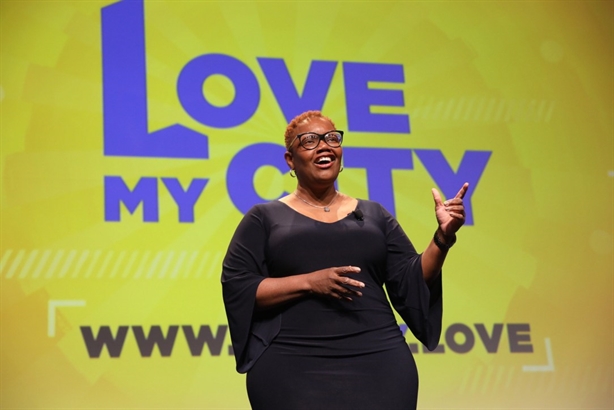Uplifting Legacy Cities
June 04, 2019 by Brian Aylward
National League of Cities' Journey to Revitalize Industrial Communities

Photo credit: Jason Dixson for the National League of Cities
In times of difference, one force powerful enough to bring people together is love. That’s why 2019 National League of Cities, (NLC), President and Mayor of Gary, Indiana, Karen Freeman-Wilson, launched her “Love My City” campaign.
The campaign aims to develop strong emotional connections between cities and their residents, leveraging the natural love people have for their communities. It includes the following key initiatives:
- Encouraging civic engagement
- Uplifting legacy cities
- Creating communities for all generations
- Ensuring housing for all
Uplifting Legacy Cities
During the recent NLC Capstone Leaders Forum, city leaders and private sector partners from across the county discussed strategies specific to uplifting legacy cities. The Legacy Cities Initiative defines a legacy city as typically an older, industrial urban community that has experienced significant population and job loss, resulting in high residential vacancy and diminished service capacity and resources.
Many consider legacy cities to be the original start-ups. They were part of the industrial revolution when manufacturing companies boosted economic prosperity, resulting in a rise of urban density. As population has declined in the 21st Century, many of these cities are wondering, “what’s next?” Matt Zone, Cleveland’s Ward 15 councilmember, says in this featured article on NLC, “We are learning to reinvent ourselves in ways that build on our industrial heritage to create a future that is strong, diverse, and vibrant.”
The Capstone Forum featured eight legacy cities using innovative approaches to boost economy, increase job opportunities, improve housing development, and transform livability. Following are four examples of their great work.
Pittsburgh, Pennsylvania
In 2017, Mayor William Peduto introduced the resiliency initiative OnePGH that places emphasis on four values: people, place, planet, and performance. These values focus on community assets and the city’s rich history. What was once a city centered around steel, coal, and glass production is now zeroing in on establishing a renewable energy infrastructure, investing resources in neighborhood development, and creating opportunities for economic growth. Over the years, Pittsburgh has received several accolades from its catch phrase, “if it’s not for all, it’s not for us.” This fundamental positioning puts each resident at the forefront of decision-making. The city even hosts an annual Day of Kindness, reflecting the community focus of Mr. Rogers and his legacy. Public transparency connects the city with its residents and informs avenues for resilience. City Controller Michael Lamb, for example, uses Tyler’s Socrata Open Finance solution to display complex financial information in a digestible and visual format for public education and engagement.
Lansing, Michigan
Lansing, Michigan, a Socrata Open Data client, hopes to boost livability downtown by redeveloping common business areas and investing in housing. A declining population has reduced interest in private sector housing development. With attention to beautification of the city’s lands, including new trees and flowers, trash cans, and a new approach to address blighted properties, city staff hope to create a vibrant community that is attractive to residents and businesses alike. Mayor Andy Schor is leading by example by being the first mayor in 30 years to put his children into the Lansing Public School system. His dedication to working and living within the city is helping residents connect with his vision to focus on neighborhoods, economic development, infrastructure, and schools.
Rochester, New York
On May 16, Rochester’s Mayor, Lovely A. Warren, launched Rochester 2034. This comprehensive 15-year plan details the city’s efforts to increase population and diversity, leverage neighborhood assets, and develop the community’s workforce. Revitalization efforts focused significantly on affordable housing. In particular, housing necessary for middle-class workers remains scarce. By paying close attention to the housing market, the city hopes to reinforce strong neighborhoods.
Rochester uses Tyler’s Munis financial management system to support city staff processes and to manage accounts, budgets, and project performance needs. This frees up staff time so experts on the ground can focus on what matters most for their residents.
Hartford, Connecticut
Hartford lies between the start-up cities of Boston and New York. Leaders observed residents seeking opportunities outside Hartford city limits and developed a solution to sustain population and attract new talent, creating their own innovation ecosystem.
Erik Johnson, Director of Development Services, noted how the city leveraged its many headquartered insurance companies along with universities such as Yale and Wesleyan to create new partnerships. These innovative public-private connections help to attract and retain new talent.
In addition to improving the job market and attracting new residents, Hartford is dedicated to bettering the quality of life for current residents. The city uses Tyler’s EnerGov platform to connect citizens and businesses to permitting applications, code enforcement, and inspections. Tyler’s Socrata Open Data platform allows the public to consume and use the city’s information on their own for potential solutions to community issues like managing blighted properties.
The Role of Infrastructure
What those examples and others illustrate is that attention to infrastructure – physical and digital – is critical in order to uplift a legacy city. Pittsburgh, Lansing, Rochester, and Hartford are effectively leveraging their people, data, and processes to address the housing market, attract new businesses, and make the most out of existing community assets.
In addition, each city is paying close attention to the role civic engagement plays in earning public buy-in to accomplish strategic goals. They are early adopters of enabling a digital infrastructure to tackle physical infrastructure related issues and demands. To residents, “Love My City” means feeling heard, appreciated, and engaged. To government workers, “Love My City” means having the tools, skills, and processes in place to best serve their community.
Tyler Technologies is honored to support the National League of Cities campaign, and cities across the country who are looking to improve operations, increase civic engagement, and inspire transparency. We believe in a vision of Connected Communities: seamless communication of important data to improve citizen services and agency outcomes.